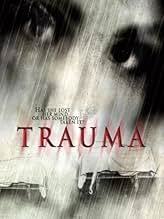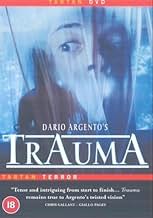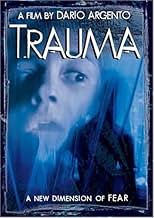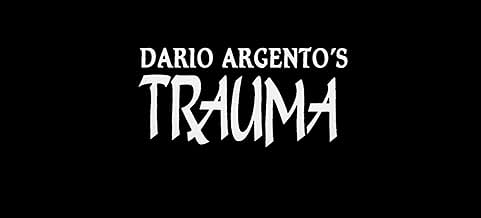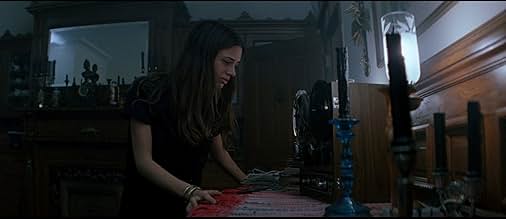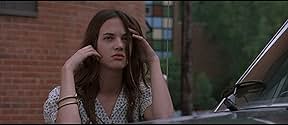VALUTAZIONE IMDb
5,8/10
8588
LA TUA VALUTAZIONE
Un giovane cerca di aiutare una ragazza europea adolescente che è scappata di ospedale dopo avere assistito all'omicidio dei suoi genitori da parte di un serial killer. Cercano di trovare l'... Leggi tuttoUn giovane cerca di aiutare una ragazza europea adolescente che è scappata di ospedale dopo avere assistito all'omicidio dei suoi genitori da parte di un serial killer. Cercano di trovare l'assassino prima che l'assassino li trovi.Un giovane cerca di aiutare una ragazza europea adolescente che è scappata di ospedale dopo avere assistito all'omicidio dei suoi genitori da parte di un serial killer. Cercano di trovare l'assassino prima che l'assassino li trovi.
- Regia
- Sceneggiatura
- Star
- Premi
- 2 candidature totali
Isabell O'Connor
- Georgia Jackson
- (as Isabell Monk)
Recensioni in evidenza
Dario Argento makes a clunky transition to film-making in the United States with "Trauma," but still succeeds in creating an atmosphere of suspense and menace. The cast, while well-chosen, is prone to overacting (with Piper Laurie and Frederic Forrest being the key offenders), and the plot revolves heavily around coincidence. Despite this, Argento's skillful POV shots (the hospital sequence is especially impressive) imbue the film with an efficient mood of dread, and the story, once fully revealed, makes a bit more sense than the director's earlier, more artistic efforts. Tom Savini's makeup effects are well-done, but underutilized (even in the uncut version).
Argento's American filmed giallo movie in which an unknown killer decapitates victims using a small mechanical device during rain storms. One kill is achieved by first activating a motel room fire extinguisher before execution. I liked this aspect of the movie. I noticed a few nods to Hitchcock too, some music and a shower scene. Dario's daughter Asia, 18 at the time, stars. A very attractive young woman and I am no prude but I felt her brief topless scene was not really necessary,
One of the things that spoilt Trauma was for me what I can only describe as silliness, one decapitated head manages to utter a name, another yells out loud as it falls down a lift shaft. Some of the musical score would not be out of place in a comedy, so different from the Goblin soundtracks from Argento's classics. Trauma looked like nothing more than a straight to video movie, the production values were no better than a half decent TV film. When the end credit roll we suddenly get a random reggae band playing at some house. Strange.
As a crime thriller/horror film Trauma is reasonable but as an Argento movie it is disappointing. Not his worst film but very poor compared to the likes of Deep Red and Suspiria.
(***1/2 out of *****)
This shot-in-Minnesota Argento mystery-thriller never gets the credit it deserves. So it's not as flashy and deliriously twisted as some of the Italian master's earlier work -- so what. It relies more on creating people you actually care about and, for this reason, I think it's one of his most character-driven films. Argento's real-life daughter (and European sex symbol) Asia Argento plays a young anorexic who witnesses the decapitation murder of her parents by a serial killer known as `The Head Hunter' who only kills when it's raining. With the help of a local TV news writer (Christopher Rydell), who is himself a recovering drug addict, she tries to solve the murders and reveal the killer's identity before he/she kills again. Although it's not quite as lavish as, say, Suspiria or Opera, there are some typically inventive touches that raise this above other early-90s slasher movies of its kind (for example, the killer uses a mechanical device with a razor-sharp wire to decapitate victims, and some heads continue to move and even speak for a few seconds after they've been cut off.) A great oddball cast (including eccentric character actor Brad Dourif, Frederic Forrest as the suspicious, unconventional doc, and Piper Laurie as Asia's batty, phony-medium mom) make it even more enjoyable -- but, honestly, this movie has one of the most unusual and seemingly out-of-place opening and closing credits sequences of any movie I've ever seen.
HIGHLIGHT: When the wire on the decapitation device snags on Dourif's necklace, the unruffled killer compensates by dragging him over to an elevator shaft and pushing his head under the descending elevator car.
This shot-in-Minnesota Argento mystery-thriller never gets the credit it deserves. So it's not as flashy and deliriously twisted as some of the Italian master's earlier work -- so what. It relies more on creating people you actually care about and, for this reason, I think it's one of his most character-driven films. Argento's real-life daughter (and European sex symbol) Asia Argento plays a young anorexic who witnesses the decapitation murder of her parents by a serial killer known as `The Head Hunter' who only kills when it's raining. With the help of a local TV news writer (Christopher Rydell), who is himself a recovering drug addict, she tries to solve the murders and reveal the killer's identity before he/she kills again. Although it's not quite as lavish as, say, Suspiria or Opera, there are some typically inventive touches that raise this above other early-90s slasher movies of its kind (for example, the killer uses a mechanical device with a razor-sharp wire to decapitate victims, and some heads continue to move and even speak for a few seconds after they've been cut off.) A great oddball cast (including eccentric character actor Brad Dourif, Frederic Forrest as the suspicious, unconventional doc, and Piper Laurie as Asia's batty, phony-medium mom) make it even more enjoyable -- but, honestly, this movie has one of the most unusual and seemingly out-of-place opening and closing credits sequences of any movie I've ever seen.
HIGHLIGHT: When the wire on the decapitation device snags on Dourif's necklace, the unruffled killer compensates by dragging him over to an elevator shaft and pushing his head under the descending elevator car.
TRAUMA
Aspect ratio: 2.39:1 (Technovision)
Sound format: Dolby Stereo
A TV newsroom artist (Mark Rydell) helps a distraught anorexic (Asia Argento) to investigate the death of Argento's mother (Piper Laurie) at the hands of a monstrous serial killer.
Though often cited as the film which signalled a creative downturn in Dario Argento's career, TRAUMA is actually a much better entry than its reputation suggests. The victim of spotty theatrical distribution and horrendous pan-scanned video versions - which reduce the wide Technovision frame to a mere shadow of its former self - the film is an exercise in giallo excess, culminating in one of the finest Grand Guignol set-pieces of this director's long career. Indeed, far from providing evidence of 'creative decline', TRAUMA is actually a fine addition to Argento's filmography, and is ripe for reappraisal.
Despite its American setting, the film is defiantly European in style and execution, employing ultra-wide scope framing, inventive camera-work (including a bizarre shot from the point-of-view of a butterfly!!), ornate narrative structure and eccentric characterizations. It's no wonder some of the supporting American players seem a little disconcerted by the director's unconventional approach (including Frederic Forrest as a doctor sporting an unexplained neck-brace, and James Russo as a typically hard-boiled cop, always one step behind the film's youthful protagonists)! And the script - co-written by Argento and celebrated fantasy author T.E.D. Klein - adheres faithfully to the giallo template, punctuating its convoluted storyline with several grisly murders (though not *that* grisly, considering the involvement of makeup wiz Tom Savini), and a number of compelling set-pieces: The seance which ends in murder; the mental institution where the killer disposes of an important 'clue'; the room full of billowing drapes (an authentic stroke of genius); and the climactic revelation of the killer's motive, which is so utterly horrific, it almost justifies his/her gruesome rampage. The movie ain't called TRAUMA for nothing!
At least two other versions of the film have surfaced in bootleg video form over the years, both of which plug a number of gaping editorial gaps in the official 'director's cut' (note, for instance, the abrupt introduction of Rydell and Asia at the beginning of the film), which indicates either distributor problems or a rushed post-production schedule. This may explain why Pino Donaggio's half-hearted score sounds like it was written and recorded before completion of principal photography and tailored to match the finished product, rather than the other way around. The cast is a typical Argentonian mixed bag: Asia portrays the same joyless harpy she's played in all her collaborations with Argento to date (including THE STENDHAL SYNDROME and THE PHANTOM OF THE OPERA), leaving Rydell to shoulder most of the film's emotional burden as a young man who learns to accept Asia's flaws whilst simultaneously falling in love with her (few) virtues. Frankly, she doesn't deserve him! Laurie makes much of her limited screen time as Asia's domineering mother, while Brad Dourif (the "Lord of the Rings" trilogy) plays a former doctor whose guilty conscience comes back to haunt him in the worst possible way. Watch out for ex-"Falcon Crest" star Laura Johnson in a brief but creepy performance (her final scene is genuinely chilling) as an ambitious TV news anchorwoman who tries to stake her claim on Rydell in no uncertain terms.
Aspect ratio: 2.39:1 (Technovision)
Sound format: Dolby Stereo
A TV newsroom artist (Mark Rydell) helps a distraught anorexic (Asia Argento) to investigate the death of Argento's mother (Piper Laurie) at the hands of a monstrous serial killer.
Though often cited as the film which signalled a creative downturn in Dario Argento's career, TRAUMA is actually a much better entry than its reputation suggests. The victim of spotty theatrical distribution and horrendous pan-scanned video versions - which reduce the wide Technovision frame to a mere shadow of its former self - the film is an exercise in giallo excess, culminating in one of the finest Grand Guignol set-pieces of this director's long career. Indeed, far from providing evidence of 'creative decline', TRAUMA is actually a fine addition to Argento's filmography, and is ripe for reappraisal.
Despite its American setting, the film is defiantly European in style and execution, employing ultra-wide scope framing, inventive camera-work (including a bizarre shot from the point-of-view of a butterfly!!), ornate narrative structure and eccentric characterizations. It's no wonder some of the supporting American players seem a little disconcerted by the director's unconventional approach (including Frederic Forrest as a doctor sporting an unexplained neck-brace, and James Russo as a typically hard-boiled cop, always one step behind the film's youthful protagonists)! And the script - co-written by Argento and celebrated fantasy author T.E.D. Klein - adheres faithfully to the giallo template, punctuating its convoluted storyline with several grisly murders (though not *that* grisly, considering the involvement of makeup wiz Tom Savini), and a number of compelling set-pieces: The seance which ends in murder; the mental institution where the killer disposes of an important 'clue'; the room full of billowing drapes (an authentic stroke of genius); and the climactic revelation of the killer's motive, which is so utterly horrific, it almost justifies his/her gruesome rampage. The movie ain't called TRAUMA for nothing!
At least two other versions of the film have surfaced in bootleg video form over the years, both of which plug a number of gaping editorial gaps in the official 'director's cut' (note, for instance, the abrupt introduction of Rydell and Asia at the beginning of the film), which indicates either distributor problems or a rushed post-production schedule. This may explain why Pino Donaggio's half-hearted score sounds like it was written and recorded before completion of principal photography and tailored to match the finished product, rather than the other way around. The cast is a typical Argentonian mixed bag: Asia portrays the same joyless harpy she's played in all her collaborations with Argento to date (including THE STENDHAL SYNDROME and THE PHANTOM OF THE OPERA), leaving Rydell to shoulder most of the film's emotional burden as a young man who learns to accept Asia's flaws whilst simultaneously falling in love with her (few) virtues. Frankly, she doesn't deserve him! Laurie makes much of her limited screen time as Asia's domineering mother, while Brad Dourif (the "Lord of the Rings" trilogy) plays a former doctor whose guilty conscience comes back to haunt him in the worst possible way. Watch out for ex-"Falcon Crest" star Laura Johnson in a brief but creepy performance (her final scene is genuinely chilling) as an ambitious TV news anchorwoman who tries to stake her claim on Rydell in no uncertain terms.
A young man (Christopher Rydell) finds an bulimic girl (Asia Argento) who has escaped her parents. When returned to them, a killer with a unique mechanical decapitation device strikes. Soon, the two must find out who the killer is, and what they want.
Released in 1993, "Trauma" has received some flak from Dario Argento fans, who consider it one of his weaker efforts. In a way, I can agree-the movie has several plot holes, the acting is largely hit and miss (Asia is pretty inexperienced here), and it's not as gory and stylish as his other films.
Yet, there's still plenty to recommend in this movie. The movie is Argento's more character and plot oriented films, and it's surprisingly easy to follow. There's also still plenty of Argento's wonderful stylish touches, and while not as gory as his previous movies, there's still some great kills (including a great bit involving an elevator). The score by Pino Donnaggio, while not as good as Argento's past musicians, is still up to task. Finally, the presence of several acting vets (including James Russo, Brad Dourif, Frederic Forrest, and an excellent Piper Laurie) don't hurt at all.
"Trauma" is not Argento's best movie, and certainly pales in comparison to movies like "Deep Red", "Suspiria", and "Inferno." As it stands though, it's an underrated movie, and worth a look, especially if you are an Argento fan.
Released in 1993, "Trauma" has received some flak from Dario Argento fans, who consider it one of his weaker efforts. In a way, I can agree-the movie has several plot holes, the acting is largely hit and miss (Asia is pretty inexperienced here), and it's not as gory and stylish as his other films.
Yet, there's still plenty to recommend in this movie. The movie is Argento's more character and plot oriented films, and it's surprisingly easy to follow. There's also still plenty of Argento's wonderful stylish touches, and while not as gory as his previous movies, there's still some great kills (including a great bit involving an elevator). The score by Pino Donnaggio, while not as good as Argento's past musicians, is still up to task. Finally, the presence of several acting vets (including James Russo, Brad Dourif, Frederic Forrest, and an excellent Piper Laurie) don't hurt at all.
"Trauma" is not Argento's best movie, and certainly pales in comparison to movies like "Deep Red", "Suspiria", and "Inferno." As it stands though, it's an underrated movie, and worth a look, especially if you are an Argento fan.
Lo sapevi?
- QuizThe character played by Asia Argento is inspired by her half-sister Anna (Nicolodi's daughter from a previous marriage) who actually suffered from anorexia. Anna died in a scooter accident in 1994 shortly after the film's release, but she is seen in the actual movie during the closing credits dancing in the balcony.
- BlooperThe newscaster says that Dr. Judd died on impact at the scene of the accident, but he actually delivers some last words before succumbing.
- Versioni alternativeA special uncut version reportedly available on video features 7 minutes of footage omitted from foreign prints including:
- a new introduction of the Aura and David characters: David (Chris Rydell) drives Grace (Laura Johnson) to the airport and sees Aura (Asia Argento) being beaten by a man whose plane ticket she tried to steal;
- a new scene features Grace visiting David at the TV station and asking him about Aura; David invites Grace to his house and then calls Aura at home to ask her if she needs any food; Aura lies to him and tells she's already eaten;
- Aura visits a market and is spotted by Dr. Jarvis (Frederic Forrest), who tries to catch her;
- After David and Aura escape from the Marigold, she tells him she's taken a little souvenir from Nurse Volkmann's purse; another new shot shows the Marigold's owner talking to the police;
- David checks into a hotel after following Linda Quirk's car and asks for a room overlooking the parking lot;
- David asks for information about Dr. Lloyd in a saloon;
- After David calls Grace and asks her for prescription forms, she meets and confronts him, trying to make him face the fact that he's become a junkie;
- The death scenes of Linda Quick and of the killer are more graphically explicit (the wire is seen cutting through Linda's neck).
- ConnessioniFeatured in Dario Argento: Il mio cinema (1999)
- Colonne sonoreRuby Rain
Sung by Laura Evan
Lyrics by Paolo Steffan
Music by Pino Donaggio
Arranged and Performed by Paolo Steffan
I più visti
Accedi per valutare e creare un elenco di titoli salvati per ottenere consigli personalizzati
Dettagli
Botteghino
- Budget
- 7.000.000 USD (previsto)
- Lordo in tutto il mondo
- 475 USD
- Tempo di esecuzione
- 1h 46min(106 min)
- Colore
- Mix di suoni
- Proporzioni
- 2.35 : 1
Contribuisci a questa pagina
Suggerisci una modifica o aggiungi i contenuti mancanti


